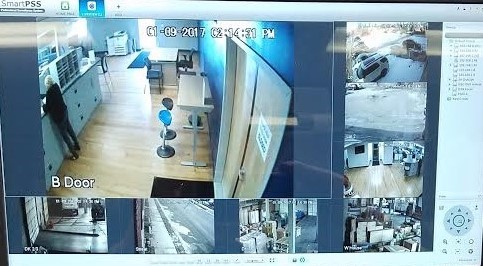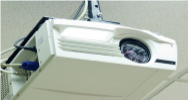Network Cabling
Installation and Smart Hands ServicesNetwork Cabling Installation and Smart Hands Services
ServiceMark designs and installs a wide range of inside network/structured cabling to accommodate all types of businesses and organizations. We install network cabling to support: communications, phone system communications, data networks, surveillance networking, paging systems, audio/video networking CATV services and more.
To assist you in the network cabling planning process, we have provided helpful information on the common types of network cabling below.
The term “network cabling” also referred to as “structured cabling” refers to the cabling infrastructure in a building, campus, or multi-campus environment.
Network cabling consists of the following components:
- Demarcation point (sometimes referred to as a “demarc”) is the point where the telephone company network ends and connects to wiring inside the customer’s premises.
- Main Distribution Frame (MDF) commonly refers to the location of the telephone system and the main components of the data network infrastructure.
- Intermediate Distribution Frames (IDFs) refers to equipment and wiring closets that are typically on different floors. In small office environments of 50 workstations or less, IDFs are usually not needed.
- Horizontal wiring typically consists of CAT3, CAT5e, CAT6, CAT6A, CAT8, Coax and Fiber Optic cables. Horizontal wiring connects the MDF and IDF(s) to individual outlets to serve workstations.
Category 3 (CAT3) Cable
Category 3 cable, commonly referred to as CAT3, is a 24 gauge twisted pair cable, and continues to be a cable standard to support traditional digital and analog telephones, traditional fax machines, and paging speakers and horns.
Category 5e (CAT5e) Cable
Category 5e cable, commonly referred to as CAT5e, is a 24 gauge twisted pair cable, and is a cable standard for 100 Mbps Ethernet computer networks for the connectivity of computers, network printers, VoIP telephones, and other IP devices that connect to the network. The CAT5e rating can be maintained for cable lengths within 330 feet. CAT5e cable is backwards compatible with CAT3. Therefore, CAT5e can also support traditional digital and analog telephones.
Category 6 (CAT6) Cable
Category 6 cable, commonly referred to as CAT6 is a twisted pair cable and is a cable standard for Gigabit Ethernet (1000 Mbps) computer networks for the connectivity of computers, network printers, VoIP telephones, and other IP devices that connect to the network. The AT6 rating can be maintained for cable lengths within 330 feet. CAT6 cable is backwards compatible with CAT5e and CAT3. Therefore, CAT6 can also support 100 Mbps Ethernet computer networks as well as traditional digital and analog telephones.
Category 6A (CAT6A) Cable
CAT6A is another standard that is available and is considered an advancement of CAT6. TIA set the limit at 500MHz, which is double the CAT6 standard. The CAT6A cable can extend up to 100 meters and transfer data at a maximum data rate of 10Gbps (10GBASE-T).
Category 7 (CAT7) Cable
CAT7 cables sound great but we recommend CAT6A due to the specs being very close to the same and CAT7 never became a standard in the industry. CAT7 is a proprietary standard developed by a group of companies but is not IEEE Standard is not approved by TIA/EIA. It does not use traditional RJ-45 Ethernet Headers and instead uses GG45 Connectors which are hard to come by due to lack of adoption of CAT 7.
Category 8 (CAT8) Cable
Cat 8 is a true enhancement of Cat 6A and the perfect upgrade path for anyone looking to expand their network’s capabilities. CAT8 is standardized and approved by IEEE and EIA and uses RJ-45 Connectors unlike the mentioned CAT7 above. CAT8 is rated supports frequencies up to 2,000 MHz over up to 30 meters and supports up to 40 Gbps over shorter cable runs.
Coaxial (Coax) Cable
Coaxial cable, commonly referred to as coax, is a cable with an inner conductor, surrounded by a flexible, tubular insulating layer and conducting shield. For inside structured wiring projects for business, coax cable is most commonly used to extend cable television signals from the main wiring closet (referred to as the main distribution frame or MDF), to each TV location.
Coax cable is the means of connection between the cable company (historically the cable TV company) and homes and offices, and can provide phone, internet, and television services.
Fiber Optic Cable
A fiber optic cable is a thin, flexible, transparent fiber that acts as a light pipe to transmit light between two ends of the fiber. Fiber optics permits transmissions over longer distances at higher bandwidths than CAT5e, CAT6, or Coax. Fiber optic cables can be used when exceeding the 330 foot distance limitation of CAT5e or CAT6 for structured wiring projects in a single building, campus environment, or multi-campus environment.
Fiber optic cables can also be used as the means of connection between a customer’s premise and the voice/data/internet carrier in order to achieve reliable connectivity and higher bandwidth than is possible with traditional copper or coax connections to an office building.
Types of Network Cabling Installations

Communications Cabling
- Data, Voice, Video and Fiberoptic
- Manufacture certifications
- Level II certified testing
- Single mode and multi-mode
- Fiber services from single cable demark extensions to over a thousand copper cables
- Infrastructure design to implementation
Video Surveillance
- IP Network Video Recorders
- CCTV analog Camera/DVRLegacy camera system support
- New installations with HD over coaxial cable
- Small to enterprise solutions
- Remote viewing configuration
Audio / Visual
- Installation of Projectors including all cabling
- Projection Screens (Electric and Manual)
- Installation of “Smart Boards”
- Audio Distribution (In-ceiling speakers)
ServiceMark’s Network Cabling Installation Experience
The Network Cabling/Structured Cabling Installation Division of ServieMark is operated by Brian Gwin. Brian has over 25 years’ experience in the industry. ServiceMark follows current standard installation practices as outlined by EIA, BICSI, TIA-569 Pathways & Spaces Standard and National Electrical Code (NFPA 70).
ServiceMark’s Network Cabing Installation Practices
Testing
All communications cabling installed by ServiceMark is compliance certified. We use Fluke Certification Testers to ensure all network cabling meets electrical requirements and functions at maximum speed. Our customer service and installation team take the time, with every client, to provide upfront due diligence to understand client needs and existing network cabling/infrastructure so that the network cabling solution that is put in place is highly reliable and the right fit for the business.
Labeling
All workstation network cabling outlet locations are electronically labeled (unless otherwise specified). We also use faceplates with plastic label fields to protect the labeling. All Networking Closets are also uniquely labeled as well as any patch panels that are part of the network configuration. Well designed labeling ensures that our customers can easily understand their networking infrastructure and where every cable terminates end to end.
As Built Drawings
As required, ServiceMark also provides “schematic drawings” that detail the customers networking “floor plan” with each cable location notated.
Professional Certifications
ServiceMark’s Network Cabling/Structured Cabling Installation Division has several certifications from industry manufacturers. These certifications validate ServiceMark’s commitment to complete work that meets or exceeds cabling installation practices as outlined by the manufacturer and the codes and specifications that dictate/govern our industry.
Insurance
ServiceMark is fully insured. We provide our customers with Certificates of Insurance listing them as the insured party.
Certifications
- Berk-Tek Certified Integrator (Cabling)
- Signamax Preferred Installer (Connectivity)
- Hikvision Dealer Installer (CCTV, IP Surveillance)
- Cambridge Certified Integrator (Sound Masking)
ServiceMark’s Smart Hands
Servicemark offers “Smart Hands” assistance to IT departments and IT Vendors. We will work together to determine the scope of work and make sure we accomplish your goals. This could be project as simple as mounting WIFI access points or cameras which could be to done to existing cabling or while we pull new cable. We can also fully deploy a data rack with all your equipment and coordinate call to testing and verify operational. We look forward to helping you working with you to accomplish your IT goals without having the travel cost for out of town deployments.
To discuss your network cabling project or Smart Hands in more detail, please contact us or call us at 816-478-2000 for a FREE Consultation!


